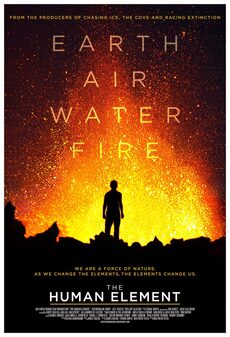|
Last night, I had the opportunity to see this new film starring photographer James Balog, who was previously featured in Chasing Ice. I highly recommend seeing The Human Element if you have the chance. What I really enjoyed about it is how well it evokes and thus makes palpable and sensual the complexities of the human relationship with nature. James and the filmmakers are able to successfully present complex scientific connections and ideas that are often confined to the language and presentation of scientific abstraction--a step too far removed from our animal senses to move us emotionally and thus to move us to action. The Human Element is thus an important contribution in shaping our future.
This need to ground climate change discussion in the terms of immediate sensation has previously been addressed by David Abram. There is a wonderful segment of the film where James sends a camera attached to a weather balloon into the upper atmosphere to sensorially demonstrate just how thin the earth's atmosphere really is. I found it moving and very akin to the kind of evocation that David Abram seems to suggest is needed. A little ironic perhaps since the mediums of film and photography necessarily mediate our senses. Another instance of philosophical interface is in James's consideration of the element of fire. He notes that the internal combustion engine hid fire from our view and thus disclosed our relationship with it. We too easily forget this dynamic process and thus blindly consume the ancient fossil fuels pulled out of the earth to our great collective detriment. This is a fantastic example of what philosopher Albert Borgmann calls the device paradigm. Philosophy aside, The Human Element is an entertaining and scientifically engaged presentation of how humans have become an increasingly significant force of nature. It manages all this without being politically divisive or preachy. Interestingly, it is completely focused on the U.S., often on conservative regions of the country that may deny the scientific evidence for climate change. Hopefully, the film will create room for positive engagement with these populations. The U.S. focus is also important as Americans are the highest per capita emitters of greenhouse gases on earth, and thus need to make the most changes. One downside in leaving out international examples is that some of the regions where the greatest climate change impacts are occurring, like small island states and low-lying countries, such as Bangladesh, are excluded. In sum, this is a beautiful film. Please see and share it with others.
0 Comments
|
Chris Dunn, PhD
Researcher, writer, explorer*, photographer, thinker. Wrestling with nature, culture, technology. Archives
July 2024
Categories
All
*When I use the term "exploration", I mean it in a personal sense (discovery for myself, or at a unique moment in time [everywhere after all--even crowded cities--endlessly await rediscovery--by new eyes and in new moments]), not in an absolute sense. With few exceptions (notably Antarctica), almost everywhere on earth has had other people around for a long time (though to varying degrees - high mountain tops or places like the interior of the Greenland Ice Sheet for instance were far less visited and populated, and undoubtedly at least some pockets of the earth were never visited or populated). It is an enlightening experience though when on an isolated ridge in what feels like the middle of nowhere to wonder if anyone has set foot there but never knowing for sure. What is significant is that the landscape itself is left in such a condition that it isn't evident. Some places ought to be kept that way.
|

 RSS Feed
RSS Feed